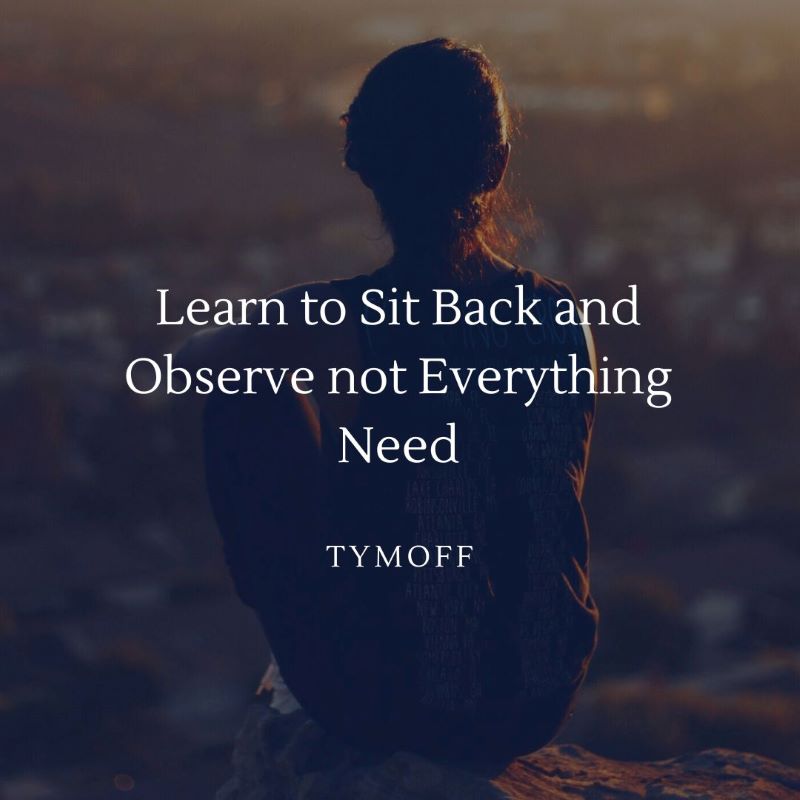Learn to Sit Back and Observe. Not Everything Need – Tymoff: In the hustle and bustle of our daily lives, we often find ourselves in situations where we feel the need to react instantly. However, there’s a valuable lesson to be learned from taking a step back and simply observing. This blog post will explore three aspects of why and how we should practice the art of observation and avoid unnecessary reactions.
Learn to Sit Back and Observe. Not Everything Need – Tymoff
In our daily lives, we often find ourselves reacting instinctively to various situations. However, not every situation necessitates an immediate response. By learning to sit back and observe, we can develop a more thoughtful and balanced perspective. This can help us make better decisions, reduce unnecessary stress, and cultivate greater understanding and empathy towards others.
The Art of Observation
Observation is a powerful tool that allows us to acquire knowledge, gain insights, and improve our understanding of people and situations. It involves more than just seeing; it’s about noticing things that others may not and understanding the subtle nuances that are often missed by the naked eye. When we pause to observe, we give ourselves the opportunity to process information more deeply, leading to clearer judgment and better decision-making.
Avoiding Unnecessary Reactions
Reacting instantly or impulsively to situations can often lead to complications and misunderstandings. Not every action demands a reaction, and it’s important to discern when and where our input is genuinely needed. Giving ourselves a moment to observe before we react can prevent us from saying or doing things we might regret later. It can also help us understand the situation better, leading to a more thoughtful and appropriate response.
Practicing Mindfulness
Mindfulness is the key to effective observation. It means being in the present moment, fully aware of what’s happening around you, without passing judgment. Mindfulness helps us take a step back, observe, and not get carried away by the whirlwind of thoughts and emotions that an event may trigger. It’s about accepting the situation as it is, rather than what we think it should be. By practicing mindfulness, we can reduce stress, improve our mental well-being, and enhance our observational skills.
The Power of Observation
Observation is an essential skill for understanding and interacting with the world around us. By taking the time to observe, we can gain valuable insights about our environment and the people in it, which can help us make more informed decisions and responses. It’s important to practice and develop our observation skills, as it can lead to better understanding, improved communication, and increased empathy. Learning to observe without immediate reaction gives us the time to process and evaluate situations more thoroughly. This can provide a more nuanced understanding of events, leading to more effective and appropriate responses.
Benefits of Observation
- Deepens your understanding of various situations.
- provide information about how relationships work.
- Informs your decision-making process.
- Improve your communication skills through regular observation exercises.
- Enhances your creativity.
- It helps you understand others better.
- It enables you to respond to situations more effectively by focusing on facts instead of assumptions.
- Leads to increased emotional intelligence.
- Contributes to overall peace of mind through increased mindfulness.
Developing a mindfulness routine to improve observation skills
Developing a mindfulness routine is instrumental in enhancing observation skills. By practicing mindfulness, you can heighten your awareness of your surroundings, improve your focus, and reduce impulsive reactions. You can cultivate mindfulness through various exercises, such as meditation, mindful eating, and yoga. Start with short sessions and gradually increase the duration as your comfort and concentration improve. As you continue this practice, you’ll find your observation skills improving, leading to more thoughtful responses and decisions.
Pros & Cons of Learn to Sit Back and Observe. Not Everything Need – Tymoff
Everyone can achieve more effective and satisfying results in many areas of life by striking a balance between observation and action and being aware of these benefits and drawbacks.
Pros
- Developing a mindfulness routine to improve observation skills can lead to a better understanding of situations.
- Using observation skills to enhance creativity and problem-solving abilities can lead to innovative solutions.
- Implementing a “wait and see” approach in decision-making can result in more thought-out decisions.
- Practicing empathy by trying to understand others’ perspectives before responding can lead to better interpersonal relationships.
- Training oneself to focus on the facts instead of making assumptions can prevent misunderstandings.
Cons
- The process of learning to sit back and observe instead of reacting immediately can be challenging and requires a lot of patience.
- It may lead to perceived inaction or indecisiveness if not communicated properly.
- Observational skills might not be effective in urgent situations that require quick decisions.
- Constantly observing and analyzing situations can become mentally exhausting over time.
- The approach may not be well received by others who prefer immediate responses.
Conclusion
Learn to Sit Back and Observe. Not Everything Need – Tymoff: Learning to sit back and observe instead of reacting instantly is a valuable skill that can significantly improve our understanding of life and our interactions with others. It allows us to process information more deeply, prevent misunderstandings, and respond more thoughtfully. So, next time you find yourself in a situation where you feel the urge to react, take a moment, observe, and then decide if a reaction is truly necessary.
HussaiN is a full-time professional blogger from India. He is passionate about content writing, tech enthusiasts, and computer technologies. Apart from content writing on the internet, he likes reading various tech magazines and several other blogs on the internet. Email ID: [email protected]
